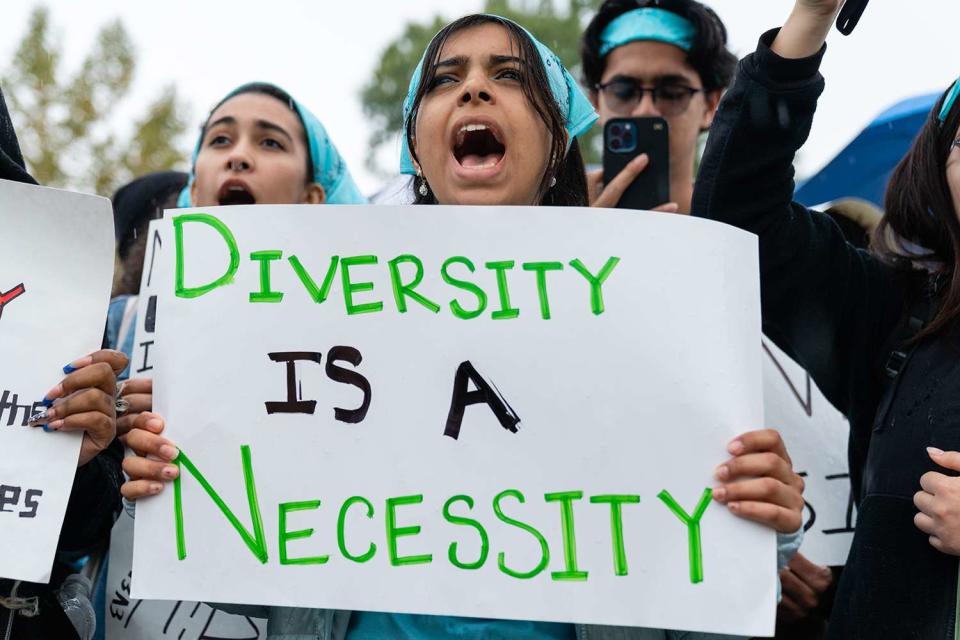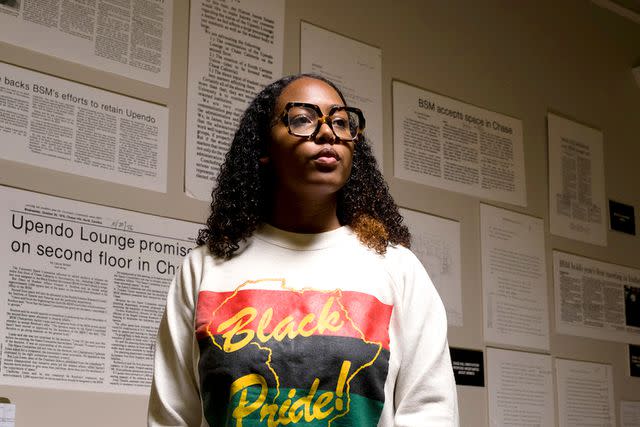Landmark Supreme Court Ruling Effectively Eliminates Affirmative Action on College Campuses
- Oops!Something went wrong.Please try again later.
The Supreme Court on Thursday effectively overturned the use of affirmative action in college admissions policies

The Washington Post via Getty Images
A Harvard University student protests in favor of affirmative action policiesThe Supreme Court on Thursday effectively overturned the use of affirmative action in college admissions policies, a practice that allows universities to consider a prospective student's race along with factors such as academic merit, athletics, and extracurriculars.
The court's 6-3 ruling came after it heard arguments in a pair of challenges to affirmative action policies in place at the University of North Carolina and Harvard University.
ln its ruling, the court determined that race-conscious admissions violates the equal-protection clause under the U.S. constitution: "While this Court has recognized a 'tradition of giving a degree of deference to a university’s academic decisions,' it has made clear that deference must exist 'within constitutionally prescribed limits.' [The universities] have failed to present an exceedingly persuasive justification for separating students on the basis of race that is measurable and concrete enough to permit judicial review, as the Equal Protection Clause requires."
In a concurring opinion, Justice Clarence Thomas argued, "Far from advancing the cause of improved race relations in our Nation, affirmative action highlights our racial differences with pernicious effect. In fact, recent history reveals a disturbing pattern: Affirmative action policies appear to have prolonged the asserted need for racial discrimination."
Related: 3 Major Supreme Court Decisions We're Expecting This Month
Meanwhile, in a dissent, Justice Sonia Sotomayor cited data showing that, "Racially integrated schools improve cross-racial understanding, 'break down racial stereotypes,' and ensure that students obtain 'the skills needed in today’s increasingly global marketplace . . . through exposure to widely diverse people, cultures, ideas, and viewpoints.' "
"More broadly, inclusive institutions that are 'visibly open to talented and qualified individuals of every race and ethnicity' instill public confidence in the 'legitimacy' and 'integrity' of those institutions and the diverse set of graduates that they cultivate," Sotomayor added.
As CNN's Supreme Court analyst Steve Vladeck explained in a tweet, the ruling doesn't "formally bar *all* race-based affirmative action, but the Court reconstrues the test in a way that will make it virtually impossible for any university to satisfy going forward."
In other words, Vladeck tweeted, "It's ending it without ending it."
Long a tool used to to help remedy historical discrimination and create more diverse student populations, proponents have argued affirmative action helps increase opportunities to underrepresented groups, including people of color. Opponents argue that the practice unfairly strips white people of those same opportunities and amounts to racial discrimination.

Cornell Watson for The Washington Post via Getty Images
Julia Clarke, President of the Black Student Movement at The University of North Carolina, in the Upendo Lounge in Chapel Hill, North CarolinaFor decades, universities have had policies that allow them to consider a prospective student's race during the admission process. Affirmative action policies have been in place in some universities since the Civil Rights era.
The ruling is likely to have sweeping effects on admissions processes and the makeup of student bodies on college campuses across the country. The ACLU has argued that a decision blocking the use of affirmative action policies "will almost certainly mean a significant drop in the number of students of color being admitted to selective universities."
The decision comes as the Supreme Court wraps up what is likely its final week of rulings in a year that saw a number of highest-profile cases, including those concerning student loan debt forgiveness and LGBTQ rights.
For more People news, make sure to sign up for our newsletter!
Read the original article on People.

